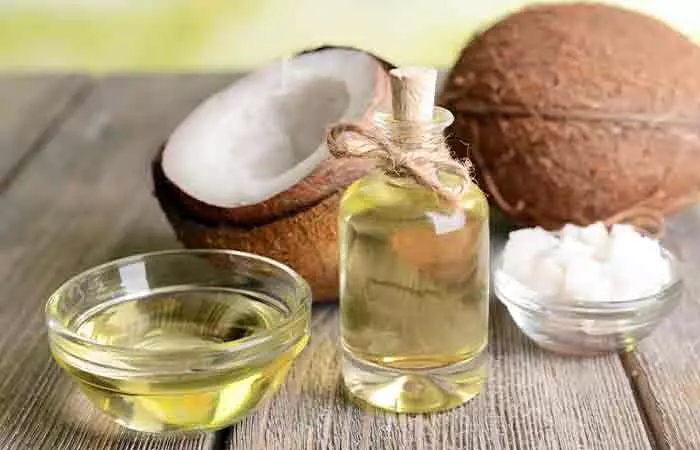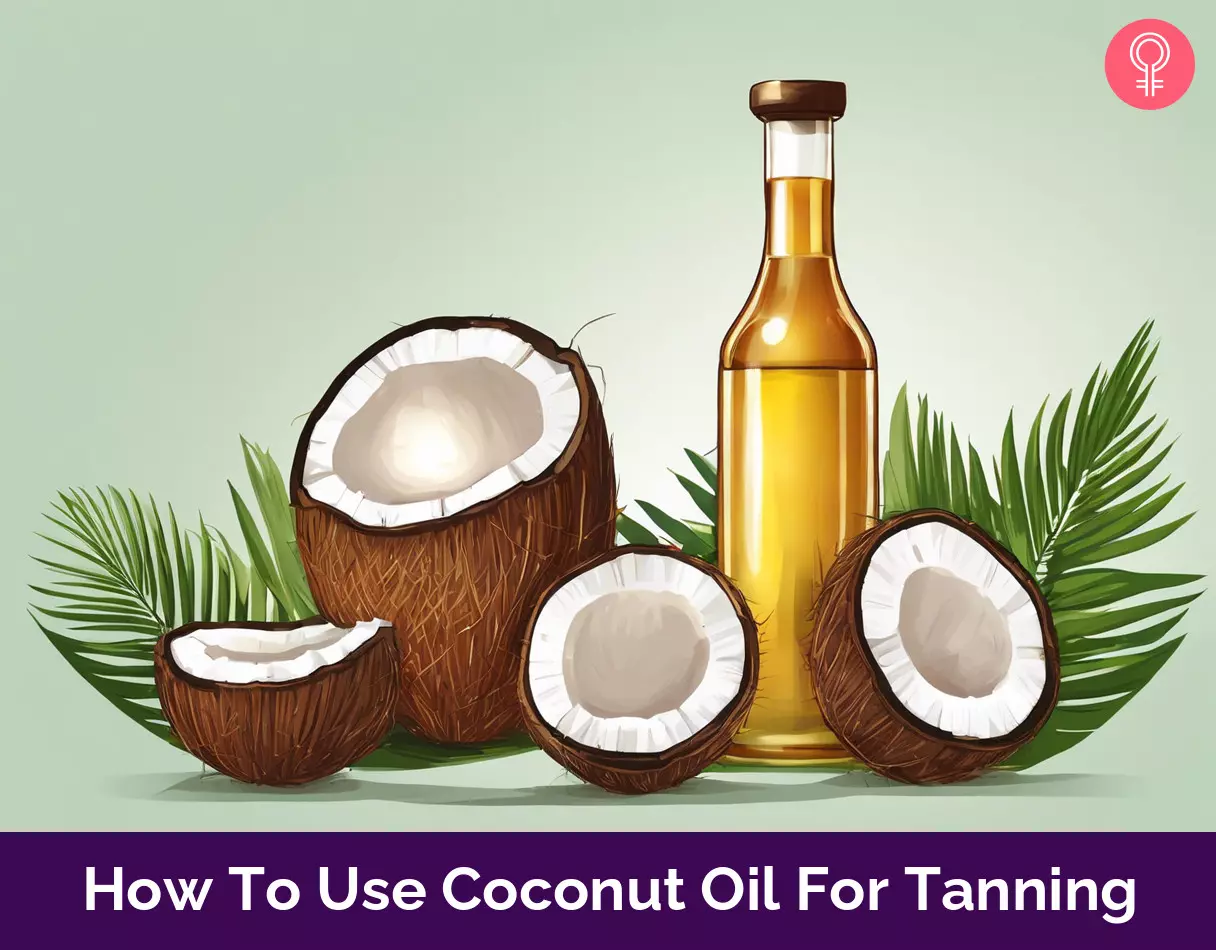Coconut oil helps you get a perfect tan and maintains your skin’s hydration levels during sunbathing. But it has its own limitations as a tanning agent. While it may enhance tanning, it does not offer sufficient protection against harmful UV rays. Hence, pairing it with a broad-spectrum sunscreen in essential. Now, how do you use it for tanning? Is it safe to use coconut oil for tanning? How does it work? This article discusses everything you need to know about tanning with coconut oil. Keep reading to learn more.
Does Coconut Oil Help You Tan?
Tanning with oils helps attract and focus the UV rays on the skin. It may also help increase the rate of tanning. While coconut oil does not provide sufficient SPF protection, it can certainly be used as an alternative to synthetic tanning lotions and oils. Dr. Anna Chacon, a board-certified dermatologist, says, “Coconut oil can help with tanning, and it helps if you want to keep your tanning “organic” and “natural.” However, coconut oil cannot protect you from sunburn and other harmful effects of the sun’s UV rays.” The composition and ingredients in coconut oil as sunscreen can benefit your skin in countless ways. Here’s precisely how it helps you tan efficiently:
1. Coconut Oil Speeds Up The Absorption Of Vitamin D
Vitamin D is essential for both your body and skin. While coconut oil blocks UV rays by 75%, thanks to its SPF of 4, it also allows your skin to absorb the goodness of vitamin D rapidly. Dermatologists suggest using coconut oil as a supplementary product but emphasize the importance of applying a top-quality sunscreen with a minimum SPF 30 to protect against sun damage.
2. Coconut Oil Nourishes And Protects Your Skin
During a tanning session, your skin is exposed to strong sunlight and harmful UV rays. Coconut oil helps cut down skin damage with the help of the stable saturated fats in it that form a protective layer on your skin (1). These saturated fats and vitamins provide nourishing care to your skin and help reduce the loss of moisture. Additionally, using coconut oil for the skin helps replenish the natural shine of your skin.
3. Coconut Oil Has Antibacterial And Antifungal Properties
Since your skin remains exposed to the sun for hours while tanning, it is an open invitation for microbes, bacteria, and fungus of all types that may cause infections. Coconut oil contains medium-chain triglycerides (MCTs), capric acid, myristic acid, and lauric acid that lend it antifungal and antimicrobial properties and guard your skin against infections (2).
4. Coconut Oil Reduces Skin Inflammation
In case of possible inflammation resulting from the scorching sun, dust, or other environmental factors, coconut oil soothes your skin and helps prevent flare-ups. Its anti-inflammatory properties also prevent your skin from peeling or cracking. Lastly, coconut oil is free of all the harmful chemicals and irritants that make the use of artificial products less preferable. Using coconut oil for a radiant, natural, sun-kissed glow is simple. For best results, use virgin coconut oil as it offers more benefits than refined coconut oil.
How To Use Coconut Oil For Tanning – Step-By-Step Tutorial
Step 1: Massage some coconut oil all over your body. Make sure you cover every bit of exposed skin to moisturize and tan evenly. If you are heading to the beach or the pool, you can take it with you in a pump bottle. Step 2: Remember to wear your sunglasses and hat. Your eyes and the skin around it are extremely delicate and need UV protection. Also, avoid falling asleep outdoors with your sunglasses as it can create some unsightly tan lines on your face. Step 3: Go bask in the sun. However, do not stay in direct sunlight for longer than 20 minutes at a time. The effects can vary from person to person, depending on your skin type. Stick to 15-20 minutes a day to get a bronze tan and soak up adequate amounts of vitamin D. Dr. Anna Chacon, a board-certified dermatologist, says “Twenty minutes under the sun with coconut oil on your skin can help you achieve a natural tan. But make sure not to stay too long under the sun.” A beauty and fashion YouTuber recommends using coconut oil to get a deep tan in case one has a very pale skin type. She records her own experience thus: “I was only tanning for thirty minutes the other day, and I came back, and I looked like burnt toast, really, in a good way, of course! (i)”. She suggests combining it with another SPF to ensure the skin stays protected throughout the process. You can enhance coconut oil’s effectiveness for tan removal by using it with turmeric. Discover why and how in the following section.
Coconut oil And Turmeric For Tanning
Turmeric is renowned for its anti-inflammatory and antioxidant properties, which not only aid in skin lightening but make it a useful remedy for tanning (3). What You Need
2 tablespoons coconut oil 1 teaspoon turmeric powder
Process
The Dangers of UV Exposure
Spending a lot of time in the sun, especially without sun protection, can not only damage your skin but can also cause premature aging and lead to skin cancer. Coconut oil as tanning oil works best for women. So, the question is, is there such a thing as a safe suntan? The answer is, yes. Although it does not come without risks, the best way to get a healthy tan is to not overexpose your skin to UV rays. It is advisable to tan gradually by dividing your time under the sun evenly to reduce sunburn. Tan in small doses and choose wisely what time you decide to go for a suntan. The United States Environmental Protection Agency (EPA) says UV strength is greatest from 10 a.m. to 4 p.m. during sunny summer days (4). Is coconut oil a natural sunscreen? Check out the below infographic to know more!Illustration: StyleCraze Design Team No. Natural oils like coconut oil cannot be used as standalone sunscreen. It does not offer the SPF needed to keep your skin safe from UV rays. Coconut oil for tan removal is a safe way for Skin. According to Dr. Anna Chacon, a board-certified dermatologist, “It can help to mix sunscreen and coconut oils to keep your skin hydrated and protected under the sun.” Is olive oil or coconut oil better for tanning? Olive oil and coconut oil are both excellent for tanning. However, using olive oil for tanning will result in a better tropical glow than coconut oil because it attracts UV rays to the skin quickly. Also, the presence of fats may help shield the skin and prevent the formation of pressure ulcers. Is coconut oil or baby oil better for tanning? Using baby oil for tanning is not safe because it allows UV rays to pass through your skin layers. Coconut oil is preferable to baby oil. Does coconut oil lighten or darken the skin? Coconut oil can help lighten the skin. Also , when used along with lemon juice, it further enhances the skin lightening process.
Illustration: How To Use Coconut Oil For Tanning













